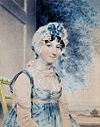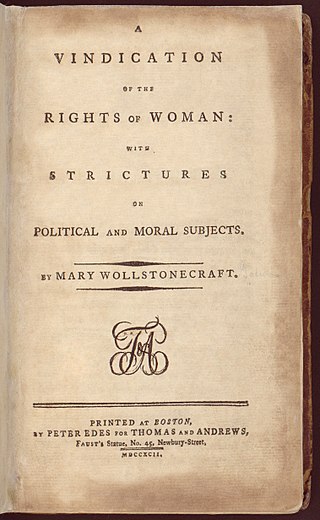
A Vindication of the Rights of Woman: with Strictures on Political and Moral Subjects (1792), written by British philosopher and women's rights advocate Mary Wollstonecraft (1759–1797), is one of the earliest works of feminist philosophy. In it, Wollstonecraft responds to those educational and political theorists of the eighteenth century who did not believe women should receive a rational education. She argues that women ought to have an education commensurate with their position in society, claiming that women are essential to the nation because they educate its children and because they could be "companions" to their husbands, rather than mere wives. Instead of viewing women as ornaments to society or property to be traded in marriage, Wollstonecraft maintains that they are human beings deserving of the same fundamental rights as men.

Educational psychology is the branch of psychology concerned with the scientific study of human learning. The study of learning processes, from both cognitive and behavioral perspectives, allows researchers to understand individual differences in intelligence, cognitive development, affect, motivation, self-regulation, and self-concept, as well as their role in learning. The field of educational psychology relies heavily on quantitative methods, including testing and measurement, to enhance educational activities related to instructional design, classroom management, and assessment, which serve to facilitate learning processes in various educational settings across the lifespan.
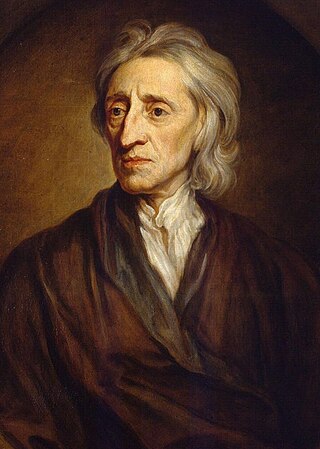
John Locke was an English philosopher and physician, widely regarded as one of the most influential of Enlightenment thinkers and commonly known as the "father of liberalism". Considered one of the first of the British empiricists, following the tradition of Francis Bacon, Locke is equally important to social contract theory. His work greatly affected the development of epistemology and political philosophy. His writings influenced Voltaire and Jean-Jacques Rousseau, and many Scottish Enlightenment thinkers, as well as the American Revolutionaries. His contributions to classical republicanism and liberal theory are reflected in the United States Declaration of Independence. Internationally, Locke’s political-legal principles continue to have a profound influence on the theory and practice of limited representative government and the protection of basic rights and freedoms under the rule of law.
The philosophy of education is the branch of applied philosophy that investigates the nature of education as well as its aims and problems. It includes the examination of educational theories, the presuppositions present in them, and the arguments for and against them. It is an interdisciplinary field that draws inspiration from various disciplines both within and outside philosophy, like ethics, political philosophy, psychology, and sociology. These connections are also reflected in the significant and wide-ranging influence the philosophy of education has had on other disciplines. Many of its theories focus specifically on education in schools but it also encompasses other forms of education. Its theories are often divided into descriptive and normative theories. Descriptive theories provide a value-neutral account of what education is and how to understand its fundamental concepts, in contrast to normative theories, which investigate how education should be practiced or what is the right form of education.

Maria Edgeworth was a prolific Anglo-Irish novelist of adults' and children's literature. She was one of the first realist writers in children's literature and was a significant figure in the evolution of the novel in Europe. She held views on estate management, politics and education, and corresponded with some of the leading literary and economic writers, including Sir Walter Scott and David Ricardo.
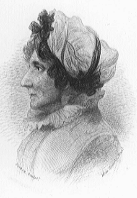
Anna Laetitia Barbauld was a prominent English poet, essayist, literary critic, editor, and author of children's literature. A "woman of letters" who published in multiple genres, Barbauld had a successful writing career that spanned more than half a century.

Hester ChaponenéeMulso, was an English writer of conduct books for women. She became associated with the London Bluestockings.
Damaris Cudworth, Lady Masham was an English writer, philosopher, theologian, and advocate for women's education who is characterized as a proto-feminist. She overcame some weakness of eyesight and lack of access to formal higher education to win high regard among eminent thinkers of her time. With an extensive correspondence, she published two works, A Discourse Concerning the Love of God (1696) and Thoughts in reference to a Vertuous or Christian Life (1705). She is particularly noted for her long, mutually-influential friendship with the philosopher John Locke.

Some Thoughts Concerning Education is a 1693 treatise on the education of gentlemen written by the English philosopher John Locke. For over a century, it was the most important philosophical work on education in England. It was translated into almost all of the major written European languages during the eighteenth century, and nearly every European writer on education after Locke, including Jean-Jacques Rousseau, acknowledged its influence.
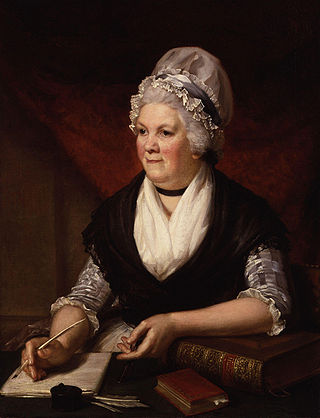
Sarah Trimmer was a writer and critic of 18th-century British children's literature, as well as an educational reformer. Her periodical, The Guardian of Education, helped to define the emerging genre by seriously reviewing children's literature for the first time; it also provided the first history of children's literature, establishing a canon of the early landmarks of the genre that scholars still use today. Trimmer's most popular children's book, Fabulous Histories, inspired numerous children's animal stories and remained in print for over a century.
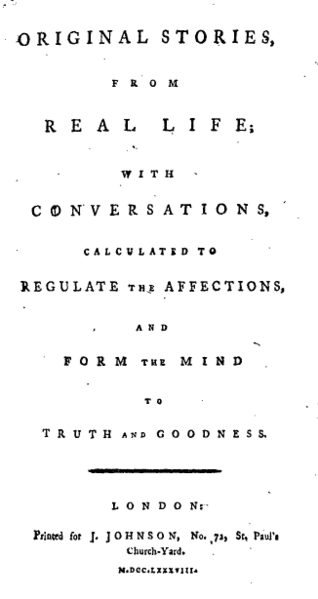
Original Stories from Real Life; with Conversations Calculated to Regulate the Affections, and Form the Mind to Truth and Goodness is the only complete work of children's literature by the 18th-century English feminist author Mary Wollstonecraft. Original Stories begins with a frame story that sketches out the education of two young girls by their maternal teacher Mrs. Mason, followed by a series of didactic tales. The book was first published by Joseph Johnson in 1788; a second, illustrated edition, with engravings by William Blake, was released in 1791 and remained in print for around a quarter of a century.

Thoughts on the education of daughters: with reflections on female conduct, in the more important duties of life is the first published work of the British feminist Mary Wollstonecraft. Published in 1787 by her friend Joseph Johnson, Thoughts is a conduct book that offers advice on female education to the emerging British middle class. Although dominated by considerations of morality and etiquette, the text also contains basic child-rearing instructions, such as how to care for an infant.
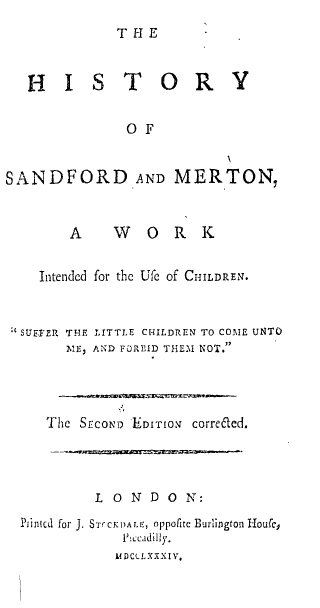
The History of Sandford and Merton (1783–89) was a best-selling children's book written by Thomas Day. He began it as a contribution to Richard Lovell and Honora Sneyd Edgeworth's Harry and Lucy, a collection of short stories for children that Maria Edgeworth continued some years after her stepmother died. He eventually expanded his original short story into the first volume of The History of Sandford and Merton, which was published anonymously in 1783; two further volumes subsequently followed in 1786 and 1789. The book was wildly successful and was reprinted until the end of the nineteenth century. It retained enough popularity or invoked enough nostalgia at the end of the nineteenth century to inspire a satire, The New History of Sandford and Merton, whose preface proudly announces that it will "teach you what to don't".

Joseph Priestley was a British natural philosopher, Dissenting clergyman, political theorist, and theologian. While his achievements in all of these areas are renowned, he was also dedicated to improving education in Britain; he did this on an individual level and through his support of the Dissenting academies. His grammar textbook was innovative and highly influential. More importantly, though, Priestley introduced a liberal arts curriculum at Warrington Academy, arguing that a practical education would be more useful to students than a classical one. He was also the first to advocate the study and teaching of modern history, an interest driven by his belief that humanity was improving and could bring about Christ's Millennium.

Lessons for Children is a series of four age-adapted reading primers written by the prominent 18th-century British poet and essayist Anna Laetitia Barbauld. Published in 1778 and 1779, the books initiated a revolution in children's literature in the Anglo-American world. For the first time, the needs of the child reader were seriously considered: the typographically simple texts progress in difficulty as the child learns. In perhaps the first demonstration of experiential pedagogy in Anglo-American children's literature, Barbauld's books use a conversational style, which depicts a mother and her son discussing the natural world. Based on the educational theories of John Locke, Barbauld's books emphasise learning through the senses.

Educational toys are objects of play, generally designed for children, which are expected to stimulate learning. They are often intended to meet an educational purpose such as helping a child develop a particular skill or teaching a child about a particular subject. They often simplify, miniaturize, or even model activities and objects used by adults.

The Guardian of Education was the first successful periodical dedicated to reviewing children's literature in Britain. It was edited by 18th-century educationalist, children's author, and Sunday school advocate Sarah Trimmer and was published from June 1802 until September 1806 by J. Hatchard and F. C. and J. Rivington. The journal offered child-rearing advice and assessments of contemporary educational theories, and Trimmer even proffered her own educational theory after evaluating the major works of the day.
This is a timeline of philosophy in the 17th century.
This is a timeline of the 18th century in philosophy

Honora Edgeworth was an eighteenth-century English writer, mainly known for her associations with literary figures of the day particularly Anna Seward and the Lunar Society, and for her work on children's education. Sneyd was born in Bath in 1751, and following the death of her mother in 1756 was raised by Canon Thomas Seward and his wife Elizabeth in Lichfield, Staffordshire until she returned to her father's house in 1771. There, she formed a close friendship with their daughter, Anna Seward. Having had a romantic engagement to John André and having declined the hand of Thomas Day, she married Richard Edgeworth as his second wife in 1773, living on the family estate in Ireland till 1776. There she helped raise his children from his first marriage, including Maria Edgeworth, and two children of her own. Returning to England she fell ill with tuberculosis, which was incurable, dying at Weston in Staffordshire in 1780. She is the subject of a number of Anna Seward's poems, and with her husband developed concepts of childhood education, resulting in a series of books, such as Practical Education, based on her observations of the Edgeworth children. She is known for her stand on women's rights through her vigorous rejection of the proposal by Day, in which she outlined her views on equality in marriage.
















